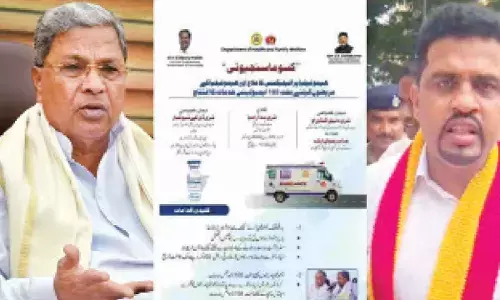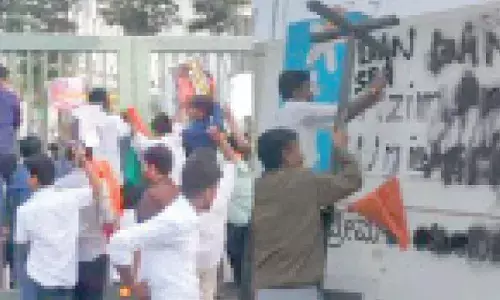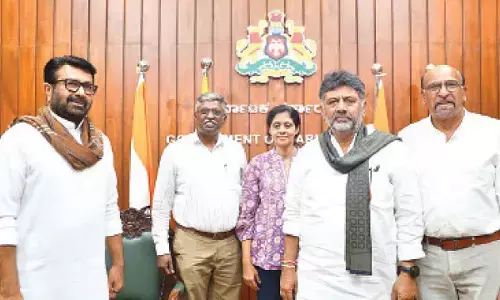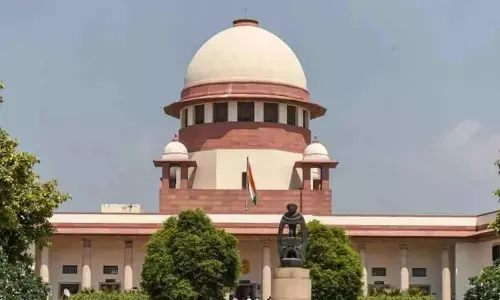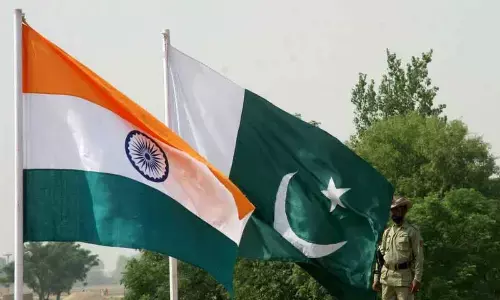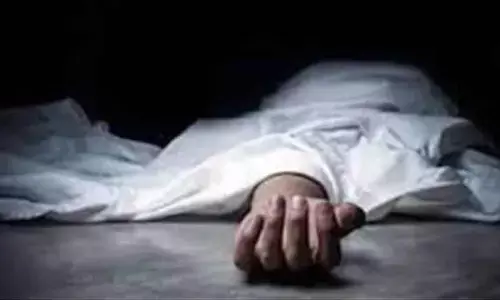Time to recognise Netaji & INA brought freedom
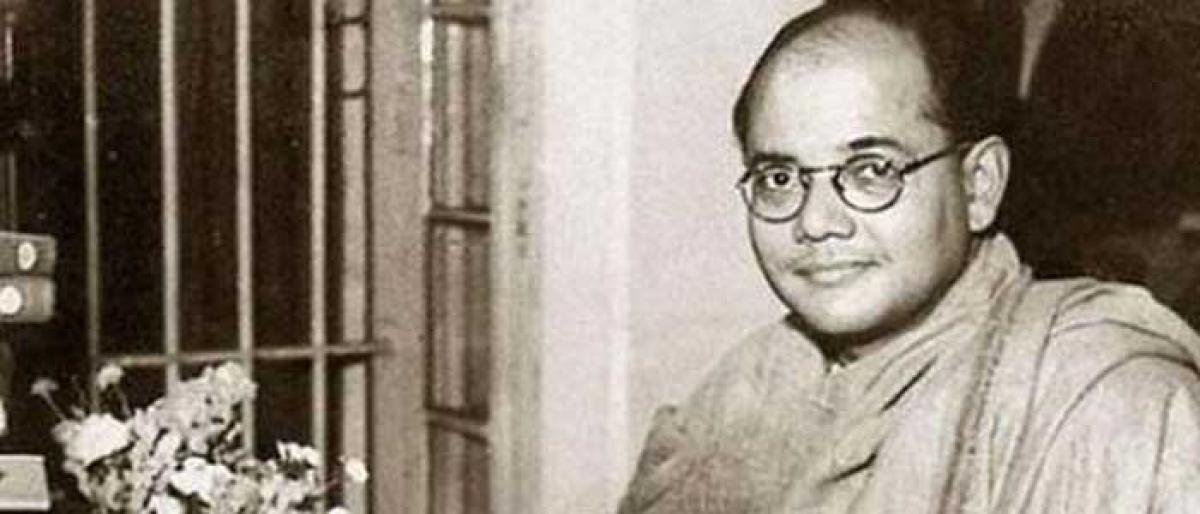
In a few days from now, on August 15, India will complete 70 years of Independence. There will be celebrations and public functions and paeans will be sung in praise of those who supposedly brought us freedom. But the history books have been written by those who came to power in 1947 and regretfully the role of many important players has been virtually omitted. Prime among these are the names of N
In a few days from now, on August 15, India will complete 70 years of Independence. There will be celebrations and public functions and paeans will be sung in praise of those who supposedly brought us freedom. But the history books have been written by those who came to power in 1947 and regretfully the role of many important players has been virtually omitted. Prime among these are the names of Netaji Subhas Chandra Bose and his Indian National Army (INA) who gave the last kick to the British.
A poorly armed INA under the leadership of Netaji fought a valiant battle against the British and entered the country through the north east planting its flag on Indian soil. Here it lost the battle and 24,000 soldiers to a better equipped army and to hunger and disease, but the men were never short of courage.
With strict censorship in India, the brave exploits of the INA were unknown to Indians at that time. But when Britain won the World War II, in supreme arrogance it decided to teach a lesson to Indians. Three INA soldiers – a Hindu, a Sikh and a Muslim – were put on public trial at Red Fort. This was the place where the last Mughal Emperor Bahadur Shah Zafar was tried and banished from the country and the choice of a Hindu, Sikh and a Muslim was symbolic. It was as if the entire nation was on trial.
The colonial masters, however, did not bargain for what happened next. They had thought that public would begin despising the INA officers – the moment they heard that these soldiers had deserted the British Indian Army and fought the latter along with the Japanese. Contrary to their expectations, a wave of enthusiasm ran through the country as stories of exploits of INA soldiers became public.
Even the men of British Indian Army began harboring feelings of pride for the INA soldiers and hatred for the British. This was even as political parties of all hues rushed in to offer legal aid to those on trial. The British who had ruled the country for nearly 200 years (nearly 100 years under the British sovereign and the remaining through the East Indian Company) by playing Indians against Indians and using Indian troops to keep secure the ‘jewel in the crown,’ began feeling insecure for the first time after 1857.
Military intelligence reports suggested that Indian officers and soldiers of the British Indian Army could no longer be trusted impelling the British to draw up elaborate plans to evacuate the 43,000 Britons in India in an operation code named ‘Gondola.’
So scared were the British that after three Indian officers were found guilty in the court martial and sentenced to transportation, it was deemed fit to suspend the punishment. The British realised that if they were to actually carry out the sentence, Indians would rise and physically evict them from the country. The mutiny of naval ratings across India – from Karachi to Calcutta – in early 1946 only confirmed the suspicion of the Britons that they could not hold India in its grip anymore.
Netaji was supposed to have died in an air crash in Taipei (Taiwan) on August 18, 1945 but the British knew that this was not true. Recently declassified reports reveal that the office of the British Governor of Bengal had ‘caught’ the broadcast of three transmissions of Netaji between December 1945 and February 1946 (months after he was supposed to have died) on short wave band 31.
Addressing his countrymen, Netaji said that the back of British Imperialism had been broken and that the British could concede independence to India in two years. Netaji promised to come to India and sit on judgment upon those trying ‘my men at Red Fort.’ Netaji also revealed that he was ‘at present under the shelter of great powers.’ From revelations from other declassified files we can infer that the Congress leaders did not savour the prospect of Netaji returning.
On July 22, 1946, Khurshed Naoroji, one of the Secretaries of Mahatma Gandhi, wrote to Lord Mountbatten: ‘At the heart the Indian army is sympathetic to the INA. If Bose comes with the help of Russia neither Gandhiji nor Nehru nor the Congress will be able to reason with the country.’ USSR is the country that Netaji Subhas Bose is supposed to have disappeared into.
Declassified records now also reveal that on October 25, 1945, the British Prime Minister was chairing a cabinet meeting for ‘finalization of a policy towards Bose’ discussing a confidential note on the subject by the Viceroy of India Lord Wavell. What that policy is not clear from files in India but does establish that Netaji was still alive at that time.
On July 3, 1947, Lord Mountbatten, the new Viceroy of India, announced that India would be free on August 15, 1947 thus the earlier expected date of September 1948 was advanced. He also announced that the country would be partitioned. The Congress Working Committee (CWC) accepted this proposal of partition like meek lambs. Only Aruna Asaf Ali in the CWC opposed it while Mahatma Gandhi did not open his mouth because he was on maun vrat.
Actually, Gandhiji had become irrelevant in Congress by then: Nehru and Patel had taken over the party. Nehru was a great friend of Lord Mountbatten and his wife Edwina. Mountbatten was orchestrating everything after gaining the confidence of Nehru. The two had met in Singapore after World War had concluded and Mountbatten (who was supreme commander of the Allied Forces in South East Asia) put the fear of Netaji in Nehru.
He said that if Netaji returned Nehru would end up handing over the country to the latter on a platter. Mountbatten, a careerist, then went back home and bid for the position of Viceroy of India. He assured the British Prime Minister Clement Atlee that he would work through Nehru and would ensure that the Government of India after Independence would be a true successor to the British Indian government trying its best not to disturb the status quo.
That’s what actually happened but this manipulation is not recorded in the officially written history of India. The din of the ham handed partition (the partition line was drawn by a British lawyer who had no knowledge of India), in which 10-12 lakh people were displaced and around 2 lakh people lost their lives, shifted the focus away from Netaji.
But a few years later in 1956 when Clement Atlee visited Calcutta (he was no longer Prime Minister then) he was asked by the acting Governor of Bengal, Justice P B Chakravarty, the reason for the British to leave India because the Quit India movement of 1942 had petered out.
Atlee said that there were various reasons including the fact that the British could not take for granted the loyalty of the Indian soldiers after the activities of the INA and the Naval Mutiny. On the role of the Quit India movement in getting the British to leave India, he said: Minimal.
It’s time that the story of India’s freedom is rewritten and the right place be accorded to the INA and Netaji Subhas Chandra Bose whose ultimate fate is still shrouded in mystery.


